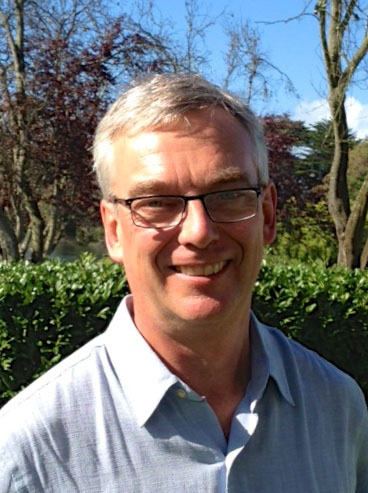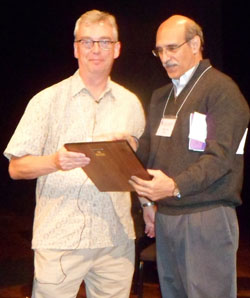Richard Harland Awarded 2014
Conklin Medal
By Marsha E. Lucas
 The
2014 Society for Developmental Biology
Edwin G.
Conklin Medal was awarded to
Richard Harland of the University of California,
Berkeley for his extraordinary and sustained
research contributions to the field of developmental
biology and mentoring of the next generation of
scientists. Harland, who served as SDB President
2009-2010, cloned and characterized the BMP
antagonist noggin, providing the molecular basis for
the Spemann-Mangold Organizer effect. The
2014 Society for Developmental Biology
Edwin G.
Conklin Medal was awarded to
Richard Harland of the University of California,
Berkeley for his extraordinary and sustained
research contributions to the field of developmental
biology and mentoring of the next generation of
scientists. Harland, who served as SDB President
2009-2010, cloned and characterized the BMP
antagonist noggin, providing the molecular basis for
the Spemann-Mangold Organizer effect.
In an interview in
July, Harland said the early nineties—the time when
they were making new gene discoveries and figuring
out how the Organizer worked—was the most rewarding
period in his career. This was made possible by the
great advances in molecular biology—in particular
Bill Smith’s expression cloning methods.
“My favorite moment
actually came after the discovery of noggin because
I was personally involved still in the experiments
in those days. Doing the experiments to show that
noggin was a direct neural inducer—that was just
unbelievably exciting,” he said.
In addition to their
extensive work on BMP antagonists, Harland’s group
made significant advances in uncovering the role of
FGF signaling during neural induction and the role
of planar cell polarity signaling in vertebrate
development.
Harland has been a
leader and tremendous resource in the Xenopus
community. He refined the methods for whole-mount in
situ hybridization in the frog which had been quite
insensitive. “I tweaked the existing method that had
been developed for the fly embryos,” he said. “The
first time I saw MyoD expression coming up in
tadpoles and knowing that this was just a big
improvement in the methods—that was very exciting.”
Harland went on to co-author
Early Development of Xenopus laevis: A Laboratory
Manual. He also co-directed the Embryology
Course at the Marine Biological Laboratory
(2002-2007), where he has taught regularly for the
past fifteen years.
In recent years,
Harland was integral in getting the Xenopus
tropicalis genome sequenced. When
Dan Rokhsar from the U.S. Department of Energy
Joint Genome Institute was looking for another
challenging vertebrate to sequence, Harland provided
the justification for a genetically tractable frog
species. “I’ve been a cheerleader [for sequencing
X. tropicalis], but it’s others that did the
grunt work,” he said.
|
 |
|
Harland receiving Conklin Medal from SDB
President (2013-2014), Martin Chalfie |
Harland did his
graduate work with
Ron Laskey at the Medical Research Council
Laboratory of Molecular Biology in Cambridge where
he studied DNA replication in vertebrates. “I showed
up as a naïve PhD student thinking this is going to
be a nine to five job,” he said. He quickly learned
that was not the case and benefited from “a terrific
set of role models at the MRC lab...particularly the
American postdocs who had...this terrific work ethic
and spirit of scientific inquiry.” Between the
postdocs, and having Ron Laskey and
John Gurdon as mentors, the MRC was a wonderful
environment, Harland said.
He went on to do a
postdoc with
Harold Weintraub at the Fred Hutchinson Cancer
Research Center in Seattle, WA. “Hal himself was
just a fountain of new ideas... to see that kind of
creativity and spirit of inquiry again at another
institute was very important and very influential.”
In 1984, Harland
started his own lab at the University of California,
Berkeley where he was greatly influenced by
John Gerhart. “He taught me a lot about frog
development,” Harland said. “He was very influential
in focusing me on interesting questions and always
being encouraging and a useful sounding board.”
Harland’s own
trainees describe him as “humble,” “approachable,”
and “honest” with “rigorous scientific standards.”
“My [mentoring]
philosophy—there’s no way that I can come up with
good ideas for everybody, so I think what I can do
is to make the lab a fun place to do science and an
interactive place,” he said.
“Making the lab a
supportive place to do research I think is my main
task. And then if you provide a good environment and
have good colleagues, then the ideas come about
through discussion or independently from people.
I’ve always found it incredibly exciting when people
have come up with a new approach themselves and then
pursue that to its conclusion.”
Harland expressed
great appreciation for being awarded the Conklin
Medal.
“The SDB is my
favorite society. I’ve tremendously enjoyed our
meetings and the spirit of developmental biology.
...So, to be recognized by my favorite society is
just an amazing privilege and I feel it’s a
recognition of all the hard work that my colleagues
have done in our joint enterprise and I guess I’m
just the lucky one—the figure head to get the nod.”
|